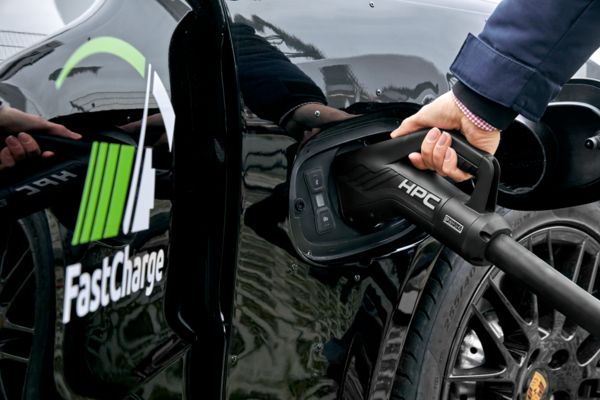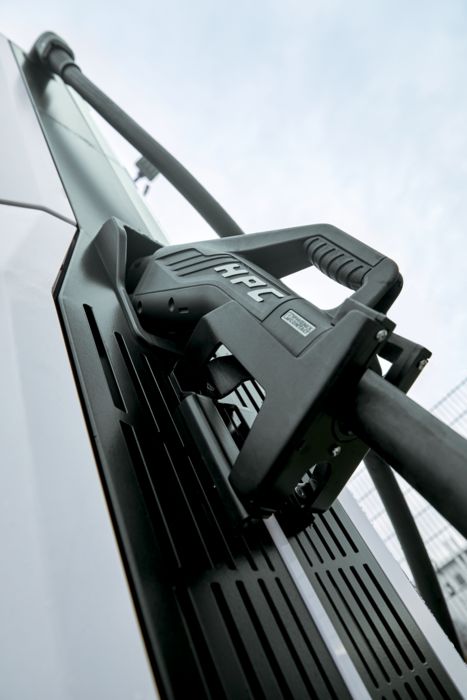Research project enables ultra-fast charging In the FastCharge research project, Phoenix Contact, together with BMW, Porsche, Siemens, and Allego, demonstrated that ultra-fast charging technology works in practice.

Overview
- The FastCharge research project was launched in July 2016 to find a way to significantly shorten the charging time for electric vehicles.
- Charging in just a few minutes is a vital prerequisite for the widespread acceptance and everyday usability of e-mobility.
- The fact that ultra-fast charging technology works in practice was confirmed when the results of the research carried out at the Euro Jettingen-Scheppach service station on the A8 freeway between Ulm and Augsburg were presented in December 2018.
- The cooled High Power Charging (HPC) system from Phoenix Contact plays an important role in this.

Dr. Markus Göhring, Frank Bauer, Stephan Elflein, Bernhard Pufal, Gerhard Oberpertinger, and Robert Ewendt (from left to right)
Project partners
Funded by the Federal Ministry of Transport and Digital Infrastructure, the FastCharge project covered all aspects of the charging process. The consortium was led by the BMW Group and other members included Allego GmbH, Dr. Ing. h.c. F. Porsche AG, Siemens AG, and Phoenix Contact E-Mobility GmbH.
The research team includes Dr. Markus Göhring (Porsche), Frank Bauer (BMW Group), FastCharge Project Manager Stephan Elflein (BMW Group), Bernhard Pufal (Allego), Gerhard Oberpertinger (Siemens), and Robert Ewendt (Phoenix Contact).
Application
Electric vehicles take too long to charge and they’re not really practical for everyday use. Many drivers cite these or similar arguments when the subject of e-mobility is brought up. For e-mobility to finally become convenient enough for everyday use, the electrical and physical limits of all components and systems involved in charging had to be explored. For this reason, the FastCharge research project was launched in July 2016. During the project, charging powers of up to 450 kW were tested. The goal was to find a charging process that was as fast and convenient as filling up at the gas station.
The joint project focused on exploring all aspects of fast charging with the aim of making the necessary technologies practical for everyday use. In addition to increasing charging power levels, the project team also explored the basic principles and processes for operating ultra-fast charging systems. Plug-and-charge, the automated login and billing process that is so important to users, was also included.

Conveniently charge electric vehicles in just a few minutes with the High Power Charging connector
Solution
This powerful charging infrastructure requires vehicles that can handle high currents and store them in their batteries. Porsche and BMW provided specifically equipped test vehicles for the FastCharge project. BMW converted an i3 and equipped it with a high-voltage battery with a 57 kWh net capacity. It takes 15 minutes to charge at up to 175 kW. Porsche’s modified Panamera went one step further, with a net battery capacity of approximately 90 kWh. An initial charging power of more than 400 kW enables charging times of less than 3 minutes for the first 100 km of range. Both vehicles are equipped with powerful cooling systems to cool the battery during the charging process.
A charging container from Siemens that contains the connection to the public power grid and the power electronics for the two charging points provides one charging point supplying 175 kW and a second one providing an unprecedented 450 kW. A low-voltage connection is all that is needed for the charging container. A complex medium-voltage connection is not required. Nevertheless, there is enough power available to simultaneously charge two vehicles at high power. The charging stations manufactured by Allego use Europe’s proven and standardized Combined Charging System (CCS) type 2 charging connectors.

The charging station on the right charges at 450 kW and the one on the left charges at 175 kW
The cooled High Power Charging (HPC) charging cables from Phoenix Contact enable the systems to charge both 400 V and 800 V battery systems depending on the vehicle model. The fast charging process of an electric car can thus increasingly be compared to refueling a conventional vehicle. The advanced charging technology makes it possible to recharge the battery of an electric car at a permanent charging current of 500 A in roughly the same time it takes to have a short coffee break. Thanks to the use of an environmentally friendly water-glycol mixture as the coolant, it is much easier to maintain the semi-open cooling circuit.
Summary
With the inauguration of this high-tech charging system in Bavarian Jettingen-Scheppach, Germany, in December 2018, the consortium demonstrated that charging times of less than 3 minutes for the first 100 km of range are possible in practice. This also proves e-mobility’s suitability for long distances. The partners in the consortium complemented each other perfectly with their expertise and technologies during the short project duration, making an important contribution to the acceptance of battery-powered electric vehicles. In the future, it will take only a few minutes, not hours, for drivers to “refuel” an electric car and continue on their way.

